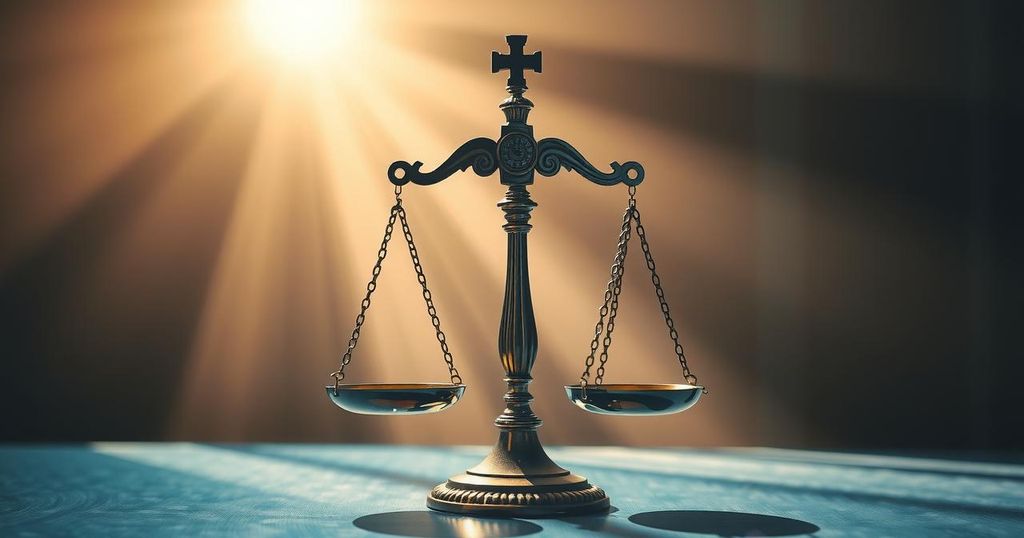UK Lawmakers Urge Stronger Measures Against Iran’s Human Rights Violations

UK lawmakers and advocates met on February 12 to address human rights violations in Iran. They supported the NCRI and Maryam Rajavi’s Ten-Point Plan, urging the proscription of the IRGC as a terrorist organization. Prominent figures emphasized the urgency for international intervention to halt executions and advocate for democratic freedoms in Iran.
On February 12, a significant event took place in the House of Lords, where key political, legal, and activist figures convened to discuss human rights in Iran. The session, hosted by Mosa Zahed, the founding director of the Middle East Forum for Development, advocated for the National Council of Resistance of Iran (NCRI) and its aspirations for democracy, specifically endorsing Maryam Rajavi’s Ten-Point Plan and the proscription of the Islamic Revolutionary Guard Corps (IRGC) as a terrorist entity.
Mosa Zahed initiated the discussion by stressing the urgency for international intervention due to the ongoing executions in Iran, highlighting the critical situation of political prisoner Behrooz Ehsani. “The Iranian people have relentlessly fought for their rights,” he remarked, emphasizing that the UK must categorize the IRGC as a terrorist organization in solidarity with the Iranian people’s quest for democratic freedoms.
Lord Henry Bellingham underscored the necessity of recognizing the NCRI’s objectives, stating, “We must continue our efforts to stop executions inside Iran and push the government to proscribe the IRGC.” He articulated that such measures would support the Iranian populace while contributing to global peace and stability amidst rampant human rights violations.
Farzaneh Najari, a member of the Anglo-Iranian Professionals, poignantly illustrated Iran’s dire condition, declaring, “Iran is a land of death.” Ms. Najari attributed numerous fatalities to government oppression, lack of healthcare, and environmental crises while imploring the UK to act decisively to facilitate regime change, asserting that even a moment’s delay could mean countless lives lost.
Malcolm Fowler, a distinguished lawyer involved with the Law Society of England and Wales, criticized the UK government’s hesitance regarding the IRGC’s proscription. He cautioned that appeasement signals weakness and that, “It is irrational to let the IRGC avoid being proscribed.” He advocated for a robust stance against Iranian authorities, suggesting that diplomatic and trade engagement should end if Iran does not adhere to appropriate norms.
Jim Shannon MP, a long-time proponent of human rights, urged immediate action, asserting, “At this very moment, the lives of NCRI supporters hang in the balance.” He emphasized the importance of supporting the Iranian people in their struggle for democracy and highlighted Maryam Rajavi’s Ten-Point Plan as a crucial framework for a just future.
Neda Zebeti, a human rights activist, connected the ongoing resistance against oppression in Iran to the historical context of the 1979 revolution, stating, “Different dictators, different ideologies, yet the same oppression.” She condemned the UK’s failure to adopt a firm stance against the IRGC while noting the inconsistency of listing its proxies as terrorist organizations.
Conservative Councillor Robert Ward expressed optimism about the regime’s current vulnerabilities, stating, “The regime has never been weaker.” He called for proactive engagement with Maryam Rajavi and for the UK to acknowledge the NCRI while continuing to push for the IRGC’s proscription.
Sheida Uraki shared her personal experiences of loss due to the regime’s brutality, mentioning, “More than 1,000 people have been executed since the new president took power.” She implored the UK government to halt such executions and support the resistance.
Siavosh Rajabi echoed the need for decisive international action, describing the NCRI as a beacon of hope. He stated, “Maryam Rajavi’s Ten-Point Plan has garnered global support,” urging the UK to embrace the NCRI, engage with its leadership, and contribute to international efforts to end executions. He emphasized the potential for a free Iran to foster global stability and peace.
The event culminated in a powerful resolve: stakeholders, lawmakers, and advocates unanimously called upon the UK government to terminate policies of appeasement, support the Iranian people’s struggle, and undertake significant steps towards fostering a free, democratic, and secular Iran.
The session in the House of Lords highlighted urgent calls for UK government intervention regarding Iran’s human rights abuses. Participants emphasized the importance of recognizing the NCRI and proscribing the IRGC as essential actions in supporting the Iranian people’s fight for democracy. The collective voice of politicians, activists, and legal professionals articulated a clear message: now is the time for decisive action to uphold human rights and advocate for a free Iran.
Original Source: www.ncr-iran.org






